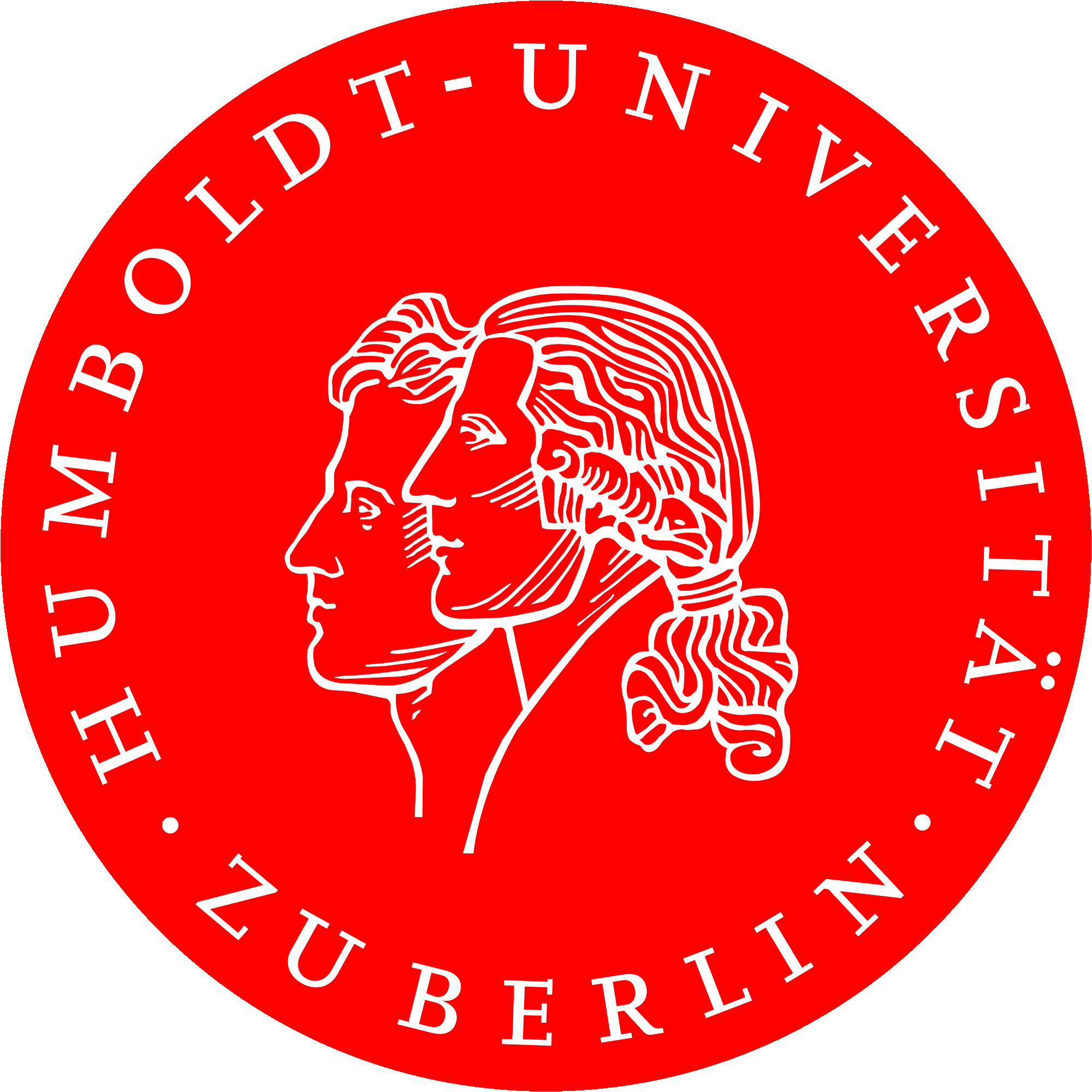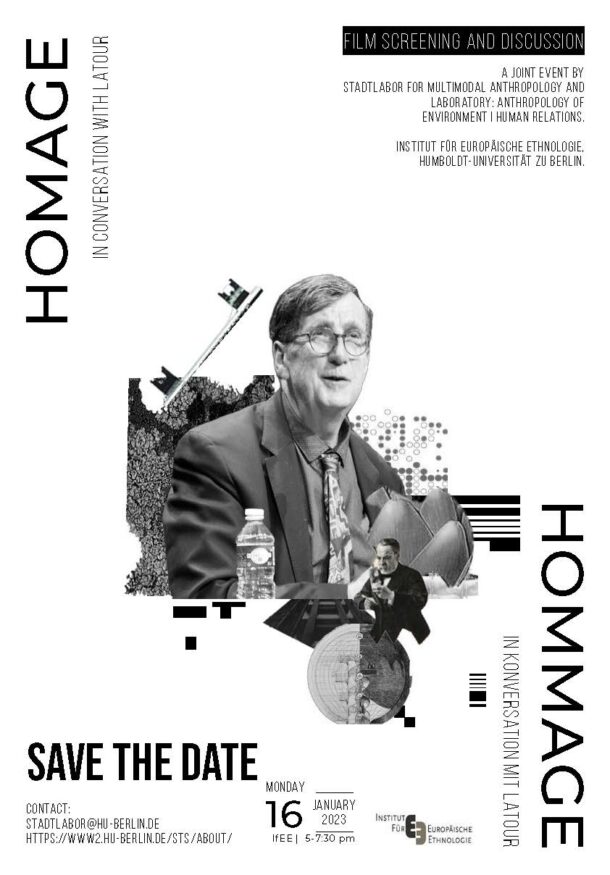On January 26, 2023, the Stadtlabor for Multimodal Anthropology and the Laboratory: Anthropology of Environment | Human Relations organized an Hommage to Bruno Latour at the Institut für Europäische Ethnologie, Humboldt-Universität zu Berlin. We entered into conversation with Latour in two ways: by displaying parts of one of his last detailed interviews (for the TV channel Arte) followed by short reflections of invited guests on how Latour has influenced their thinking and (epistemic and/or activist) doing. On the occasion, three members of the Stadtlabor – Ignacio Farías, Indrawan Prabaharyaka and Margherita Tess – shared their own encounters with Bruno Latour. After the image you will find some of their interventions.

Missing Latour by Ignacio Farías
I never met Latour, and yet here I am, paying tribute to his work, trying to express the meaning of his untimely death, to map the scope of the loss. I missed getting to know him when he was alive, and I miss him now, as I worry about how to think the contemporary.
It’s been easy over the last 20 years to find orientation with, alongside, and even against Latour. I can’t think of any other philosopher and anthropologist of the Moderns who is so radical and inventive, so clear and explicit (I’m tempted to use the word pedagogical), and so good-humored and optimistic about how to orient oneself among and especially against the many monsters of modernity. There is no text written by Latour in which you won’t have a good laugh, in which you won’t be gifted with new ideas and concepts (Latour systematically avoided repeating himself, always inventing new concepts to think about new problems), in which conventional assumptions about the social will not be challenged and you will not be invited to overcome them.
Latour was a problem-maker, a curator of modern problems and ontological scandals – a specialist in troubling modernity, in troubling the sciences, social and otherwise, in troubling modern politics and subjects, especially green ones. But he was not just a troublemaker. He was an optimist, deeply convinced that we can learn to think differently about the collectives we inhabit and that inhabit us, that we should experiment with new modes of coming together, of assembling the collective, of composing human and nonhuman life.
It is almost impossible to miss the invitation and the provocation, but one can miss the point. In fact, I did at first. Indeed, I met him once and mistook him for someone else.
LoL
It was more than 20 years ago, at the Spanish Conference on Social and Cultural Anthropology in Barcelona, where Latour was invited to give a keynote address. He gave an incredibly provocative and witty talk in which he introduced one of the many concepts he invented in his extremely prolific career: the conceptualization of scientific facts as ‘circulating references’, that is, the idea that scientific knowledge is not statements that correspond to the hard-core properties of the world out there, but that words and things are entangled in long socio-material chains of translation, so that scientific facts become like a fluid or a ghost or a reference that circulates within these chains of translation. A moving target. A circulation.
I raised my hand in the 500-person convention center and asked Latour, in broken English, if his ethnographic case study couldn’t be understood as an example of Niklas Luhmann’s theory of science, which would describe science as a self-referential system of communication connecting scientific communications in a similar chain of translation. The question in my eyes was a compliment. When I studied sociology in Chile in the late 1990s, Luhmann was one of the few theories I knew that radically challenged the anthropocentric premises of social theory. I saw someone working in the same direction.
He didn’t quite agree and quickly dismissed my question. After the lecture I tried to catch up with him and discuss the matter in more detail, but I missed him.
Then some time passed. I finished my master’s degree, left Barcelona, and moved to Berlin to begin my PhD. A good friend, José Ossandón, moved to Goldsmiths to start his PhD, and then, I think it was in 2004, he sent me an email telling me about this amazing lecture he had attended by the philosopher Graham Harman on the work of Bruno Latour. I remembered the guy from Barcelona. At the time, José and I were working on an edited volume that aimed to de-exoticize Luhmann’s theory of society and put it in dialogue with Gilles Deleuze, Michel Foucault, Michel Serres, and Jacques Derrida. We started reading everything we could find by Latour and discussing his work by email. I remember a long period of time when I was only reading the work of Bruno Latour, and quickly after that his British colleague John Law and his French accomplice Michel Callon. And I also remember a doc file in which I tried to put all the pieces together, to understand the connections between all the concepts that I would find in different papers. I remember failing at that, and then at some point understanding that Latour’s work was not a theoretical system in the way that Pierre Bourdieu or Niklas Luhmann would develop their theories of society as a highly complex, ordered, coherent theoretical system[1]. This was something else: an ontological exploration – an ethnographic and anthropological investigation of things we had learned we should never talk about: the nonhuman, the more than human world.
This was a point of no return.
The shocks of Latour
Suddenly everything I knew about the social sciences was turned upside down. No reality sui generis, no self-reference, no meaning, no discourse, but an ecology of bodies and things articulated by relations of force, by material associations, forming a flat ontology. I don’t think I can express the magnitude or the intensity of this shock, how it made everything else explode, but also take on new forms.
It wasn’t easy to deal with: I was doing an ethnography of tourism in Berlin, working in a center for urban studies. For a long time I didn’t know how to square the circle: I was obsessed and fascinated and happy to discover actor-network theory while working on a project that required me to talk about capitalist urbanization, the symbolic landscape of metropolitan cities, and the tourist industry.
By the time I’d found a small group of people who were bringing together actor-network theory and urban studies, and started working on the idea of urban assemblages, I would turn back to Latour and discover that he was already somewhere else. He was working on his exploration of different modes of existence, or more precisely, regimes of enunciation, which paradoxically had strong resonances with Luhmann’s theory of functionally differentiated communication systems.
This was such a shock – such a treacherous move, I thought. I had worked so hard to leave all that behind because I had just understood that we had never been modern, and here he was, inviting us to explore how moderns articulate different social spheres.
I began to recalibrate. Just when I thought I had found a way to understand what had just happened, how to bring it all together (for some years I worked on this paper that saw light in 2014 on how Luhmann’s theory would complement actor-network theory) he did it again.
Latour was somewhere else again: writing about Gaia – a goddess I didn’t know and couldn’t care less about. Until, in 2015, a colleague, a landscape architect, came over and invited me to work on a project about the urban heat island effect, about how to reimagine urban life in the context of a warming planet, in the context of tree death and human discomfort.
And as we begin to pay homage to his life, Latour makes sure to surprise us again, with the last video of his last interview and his last book, “On the Ecological Class,” inviting us to reconnect with the very first intuition that brought many of us, including me, into the social sciences. Latour invites us to think and rethink class, and with it capitalism, the capitalocene, and the socio-ecological struggles to come.
Missing Latour
Missing Latour, the title of this little tribute, aims to capture the difficulty of keeping up with Latour, celebrating the speed of his steps, his thinking and his inventions. Latour was a moving target – a comet would be the most appropriate figure. If you try to capture his work and his thought, to stabilize it, you’ll always miss it, because he’s already moved somewhere else, ready to trouble you and invite you to rethink the whole thing.
And that is what I will miss the most. The next curve, the next shock to my own thinking, the next invention and invitation to rethink things. Now he is gone, and a new form of curiosity is growing in me, impatient to be surprised again by the further mediations and transformations of our work. It is in our hands to reshape his thinking, his inventiveness, while keeping his good humor.

